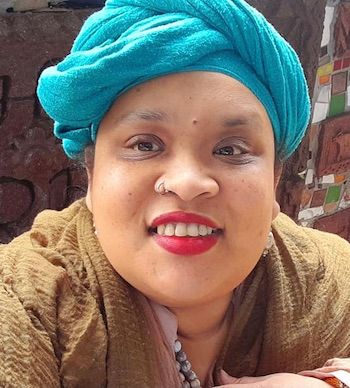Saba Zahara (Honeybush)

Summary: Saba Zahara Honeybush) uses art to fight for social and environmental justice in South Africa and abroad. She fearlessly challenges power and the current world order, maintaining that those who have destroyed the world through selfishness and greed must step aside for the youth to lead. Through her initiative, the Youth Artivist, Zahara organizes and attends events in community halls, libraries, museums, studios, and schools. Her goal at these events is to expose injustice against the poor, women and children, indigenous communities, and the environment, at the same time warning young people against violence, substance abuse, and xenophobia. As she navigates this terrain, she finds herself stepping on the feet of very powerful forces, but she refuses to be silenced.
Profile:Raised in exile in Namibia by anti-apartheid parents, Saba Zahara—a vocalist, poet, and visual artist—identifies with the struggles of the poor, indigenous communities, and women. She compares the ongoing displacements of indigenous communities to apartheid: “I don’t understand how generations of displaced families by forced removals are just supposed to continue business as usual without any justice under slogans of being free whilst further gentrification is justified. I long for dignity to be restored to global indigenous cultures . . ..”
Zahara has contributed in many ways to improving communities across Africa. In 2010 she coordinated the Embrace Dignity Campaign, a program that combatted sex trafficking in South Africa and the Western Cape in particular. As part of the campaign, she held an exhibition prior to the parliamentary hearing on the anti-sex trafficking bill. Her work contributed to shaping the bill in a way that criminalized sex trafficking in South Africa.
Zahara has volunteered to teach visual arts, human rights, and environmental education in South Africa and other parts of the world. With the help of 350 Africa. Org, an environmental rights group, she initiated the Youth Artivism project in July 2019, with the overall objective of providing a safe space for children from historically disadvantaged communities. Together with artists and activists, she helped others experiment deeply with processes of creativity and reflection about environmental crisis through art. Recently, she has mentored children in seven low-income suburbs of Cape Town to produce large-scale wall paintings that express critical issues affecting their communities. That same year, through the Gutted, a documentary that she co-directed, Zahara exposed how laws in South Africa favor industrialization of fishing at the expense of the poor.
As a volunteer, Zahara has conducted intergenerational workshops on self-development in Mitchell’s Plain and Beauford West, communities rocked by poverty and division. She has also conducted arts and culture lessons for learners in these communities in order to empower them with creative skills. On the environmental side, she has campaigned for legislation to make littering in South Africa a criminal offence, underground springs to be open for public usage, clean energy to be free for the masses and not privatized, and the climate change narrative to be led by those most affected, the mothers of Cape Town. She wants to raise awareness about climate change in a manner that is not elitist or controlled by power-hungry individuals with hidden agendas.
While others charge for the work they do, Zahara is not paid. “I always try to empower historically disadvantaged communities in everything I do,” she says. “I try to open up spaces for others to explore processes of creativity, too, especially those who had been denied this access due to socioeconomic reasons. I have empowered and changed lives of many both locally and abroad. I have helped many to fund-raise for powerful initiatives within the arts, especially for marginalized women and children, for which I have never received a commission but helped to leave a lasting legacy.”
Her activism has stepped on the feet of powerful individuals and corporates: “My main risk right now,” she acknowledges, “is digital surveillance and punishments.”
But Zahara refuses to bow down: “I am a warrior against all forms of social injustice. I am motivated by integrity and purity of intention in the deepest parts of my inner being. I can’t help it. If I ignore it, I am punished by something spiritual. It’s almost like a never-disappearing responsibility of sorts.”
